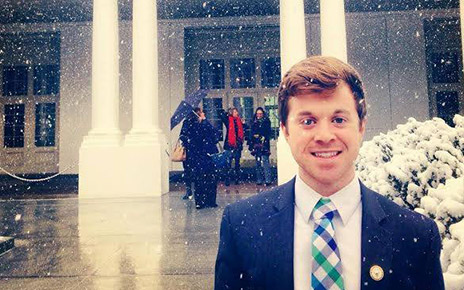Published on
Updated on
Zach Parolin dedicated much of his undergraduate focus on social justice issues, even spending spring break of his sophomore year sleeping on the streets of Amarillo—five days and nights of intentional homelessness, both to raise awareness of the problem of homeless youth and to honor his mother, who had been displaced from her biological family as a teenager. Also while at Mizzou, Zach, with a few friends, founded Project Sol, a campus organization that collaborated with Rainbow House, a local shelter for runaway and at-risk youth. In its first two years, Project Sol offered mentoring to nearly 200 homeless children and teenagers, and the program is still active in Columbia. In addition, Zach coached a Special Olympics basketball team, served as a campus tour guide, led the Alumni Association Student Board (AASB), was tapped into QEBH—Mizzou’s oldest secret honors society—and was elected Homecoming King as a senior.

Zach had begun a graduate program at George Washington University, but upon his selection as MU’s first Mark Twain Fellow, he moved to Oxford for the 2014-2015 academic year, where he earned a master’s degree in Comparative Social Policy. Zach said that the program “adopted and provided a global approach to researching politics, policies, and the social outcomes to which they lead.” He applauded its “rigorous theoretical and methodological training, but always with an eye toward applied purposes. Our research, for example, might ask: What is it about the Finnish education system that leads to Finland’s high PISA scores, and why or why not could parts of their practice be applied to the public education system in, say, Missouri? How does Germany’s large-scale apprenticeship program shape future career opportunities for youth, and how have other nations adopted some of these practices? Why is the U.S. a persistent laggard among fellow rich nations with respect to the prevalence of child poverty?” As a result, he “gained a deeper appreciation for policy research and, in particular, how European academics approached the study of policy and poverty issues.”
After completing his year at Oxford, Zach moved to Belgium, where he is in his second year as a doctoral researcher at the Herman Deleeck Centre for Social Policy, an institute affiliated with the University of Antwerp. His work focuses on “the causes and consequences of child poverty in the United States, and the many reasons why the U.S. continues to be an outlier relative to other wealthy nations in the extent of poverty within the country.” He has presented findings across Europe (in Sweden, Luxembourg, and Portugal, for example), as well as in North America (in Montreal, Chicago, and New York). He has collaborated with notable scholars in California and at Oxford. He has met with members of the Ukrainian Parliament “on the challenges of governing a fractured nation while fending off Russian aggression in the east.” From classmates, colleagues, and friends in England and in Belgium, Zach has “learned much from Muslim families … who navigate their lives knowing that they are perceived as a threat to society.”
Zach acknowledges that none of these experiences—educational, research, or personal engagement—would have occurred without the Mark Twain Fellowship: “Mizzou can provide … leadership opportunities, language courses, and an education that will prepare you to go on and succeed at an institution like Oxford [which] is precisely why the Mark Twain Fellowship is so important. … It is no hyperbole to say that the MTF completely altered my career (and life) trajectory, and certainly for the better.”